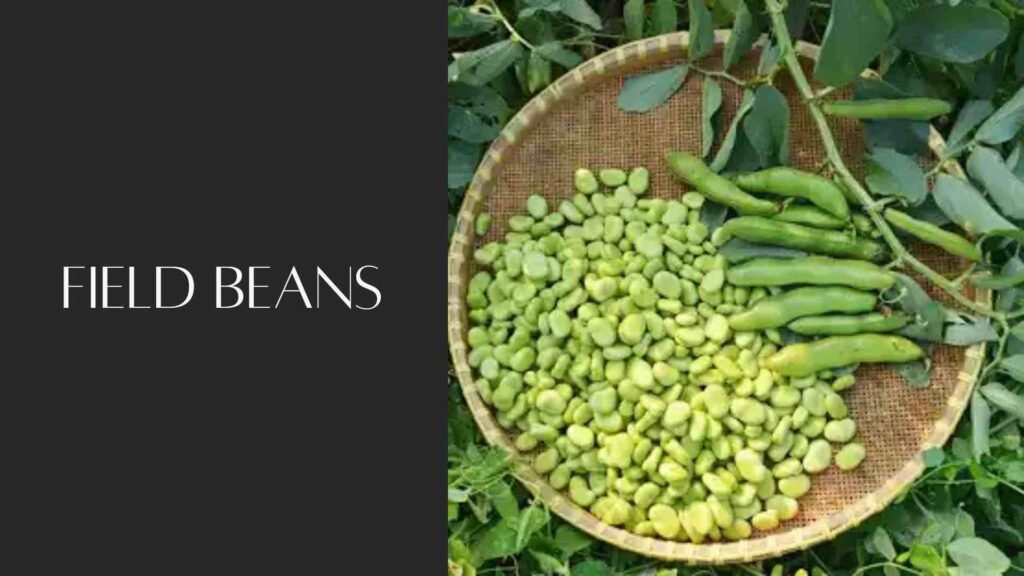Field beans are a staple in many cuisines worldwide, offering a rich taste and numerous health benefits. They are closely related to broad beans but are often preferred for their cold tolerance and reliable growth.
Field beans have gained attention not just for their ability to thrive in diverse climates but also for their ability to enrich meals with essential nutrients.
Let’s explore the growing popularity of field-beans, their nutritional value, and how they are used in different dishes.
What Are Field Beans?

Field beans, also known as Vicia faba, are a variety of beans that grow best in cooler climates. These beans are slightly smaller than broad beans but are renowned for their hearty and nutty flavor.
Field-beans are rich in protein, fiber, iron, potassium, and magnesium, making them a great addition to any diet. While traditionally used in animal feed, these beans are increasingly being utilized for human consumption, especially in regions like North Africa and parts of India.
In Indian cuisine, field-beans are commonly known as “Mochai Kottai” in Tamil, “फील्ड बीन” in Hindi, and “ఫీల్డ్ బీన్స్” in Telugu.
They are a cherished ingredient, particularly in South Indian dishes like Mochai Kottai Kuzhambu, Mochai Kottai Poriyal, and Mochai Kottai Sundal.
Nutritional Benefits of Field Beans
Field-beans offer a wealth of nutritional benefits. They are high in plant-based protein, making them an excellent choice for vegetarians and vegans.
Additionally, field-beans are packed with dietary fiber, which aids digestion and helps maintain a healthy gut. The beans also contain essential minerals such as iron, which is important for maintaining healthy blood, and potassium, which helps regulate blood pressure.
Consuming field-beans regularly can support overall well-being by boosting energy levels and promoting heart health.
Their rich fiber content also makes them a great food for weight management, as they help keep you feeling full for longer.
How to Grow Field Beans

Field-beans are relatively easy to grow, especially for those who prefer organic farming methods. These beans are known for their cold tolerance and can be grown during winter or early spring.
The seeds are typically sown directly into the ground, and most varieties take about 60-70 days to reach maturity.
Field-beans are not only hardy but also have the advantage of requiring less maintenance compared to other crops. They tend to be more resistant to pests like aphids and bruchid beetles, which commonly affect other leguminous crops like broad beans.
Field Beans in Cooking: Versatility and Flavor
Field-beans are known for their nutty and sometimes slightly sweet flavor. When harvested young, they offer a tender texture, which makes them ideal for a variety of dishes.
As the beans mature, however, they may develop a more bitter flavor, which is why it’s important to harvest them at the right time. In Indian cooking, field-beans are often used in curries, stews, and even biryanis.
Some of the popular dishes made with field-beans include:
- Field Beans Curry: A flavorful curry with spices and vegetables.
- Field Beans Pulao: A rice dish that combines the beans with aromatic spices.
- Field Beans Salad: A light and refreshing salad made with boiled field-beans, herbs, and a tangy dressing.
These dishes highlight the versatility of field-beans, which can be easily incorporated into vegetarian or vegan meals.
Where to Buy Field Beans

Field-beans are available at most local grocery stores, especially in regions where they are a common ingredient. For example, Pillai’s Indian Field Bean (Mochai Kottai) is sold online in India, with a range of sizes available, including 250g, 500g, and 1kg packs.
These beans are sourced from local farmers and processed to ensure high quality, making them a great choice for those looking to add field-beans to their pantry.
Conclusion
Field beans are a nutritious, versatile, and sustainable crop that can be enjoyed in a wide variety of dishes. With their rich nutritional profile, including high levels of protein, fiber, and essential minerals, they offer numerous health benefits.
Whether you’re incorporating them into traditional Indian dishes or experimenting with new recipes, field beans are an excellent addition to any kitchen.
By growing field-beans or purchasing high-quality varieties like Pillai’s Indian Field Bean, you can enjoy the wholesome goodness these beans bring to your meals while supporting sustainable farming practices.
Looking for more great reads? Check out our homepage maxxfour.in for trending articles and insightful blog posts on various topics.
FAQs
What are the different types of field beans?
There are various varieties of field-beans, with Fuego field-beans being one of the most popular due to their reliable growth and superior eating quality. Different varieties may have slight differences in flavor, texture, and growth characteristics.
How long do field beans take to grow?
Field-beans typically take between 60 to 70 days to mature, depending on the variety and climate conditions. In colder climates, they are often planted in early spring, while in warmer climates, they may be planted in late winter.
Can field beans be eaten raw?
It is not recommended to eat raw field-beans as they can contain toxins that are neutralized only through proper cooking. Always cook field-beans before consumption to ensure safety.
Are field beans good for vegetarians?
Yes, field-beans are an excellent source of plant-based protein and fiber, making them a nutritious choice for vegetarians and vegans. They also contain essential minerals like iron and potassium.
How do field beans compare to broad beans in terms of yield?
Field-beans generally yield more per plant than broad beans, producing a greater number of pods. However, the beans inside the pods are smaller, which means they take more effort to shell. Despite this, the higher pod count makes them a more productive crop.
Can field beans be grown in containers?
Yes, field-beans can be grown in containers, as long as they are provided with enough space and proper drainage. Containers allow for easier management and are a good option for those with limited garden space.
How should I store field beans?
Field-beans should be stored in a cool, dry place, away from direct sunlight. They can be kept in airtight containers to maintain their freshness. Dried field-beans can last for several months when stored properly.







